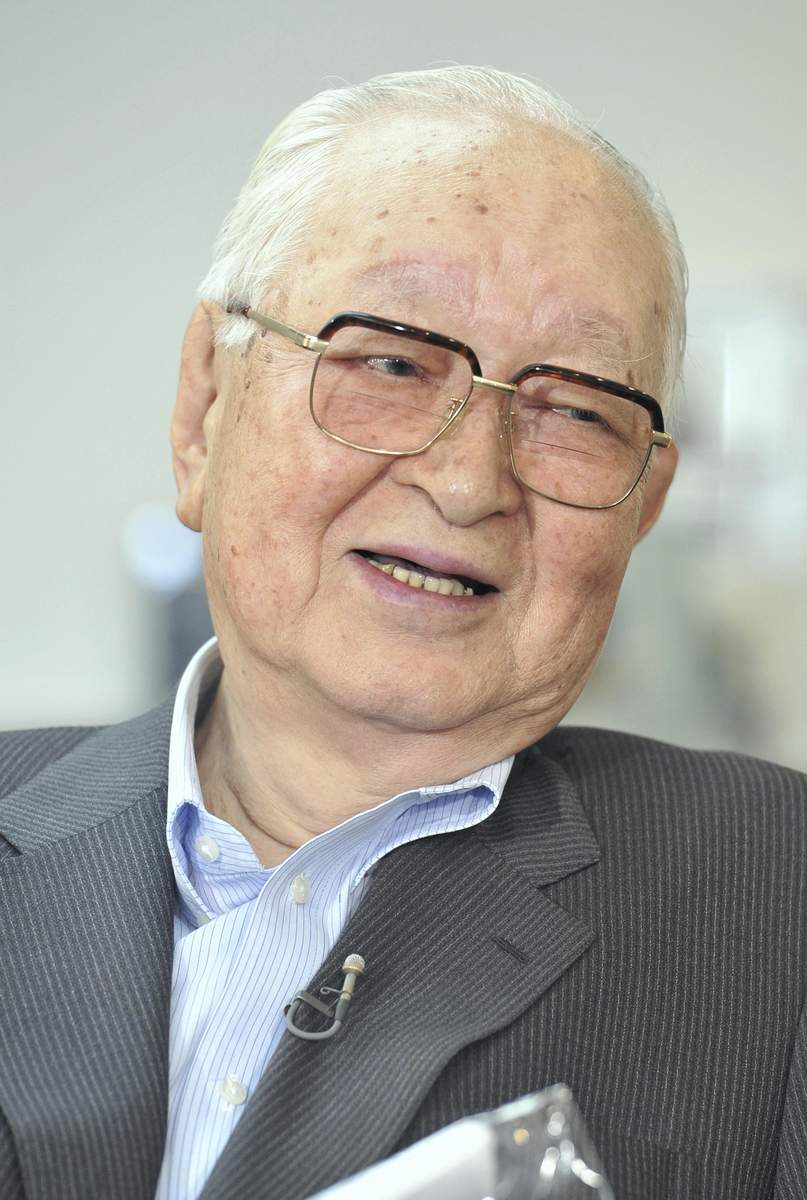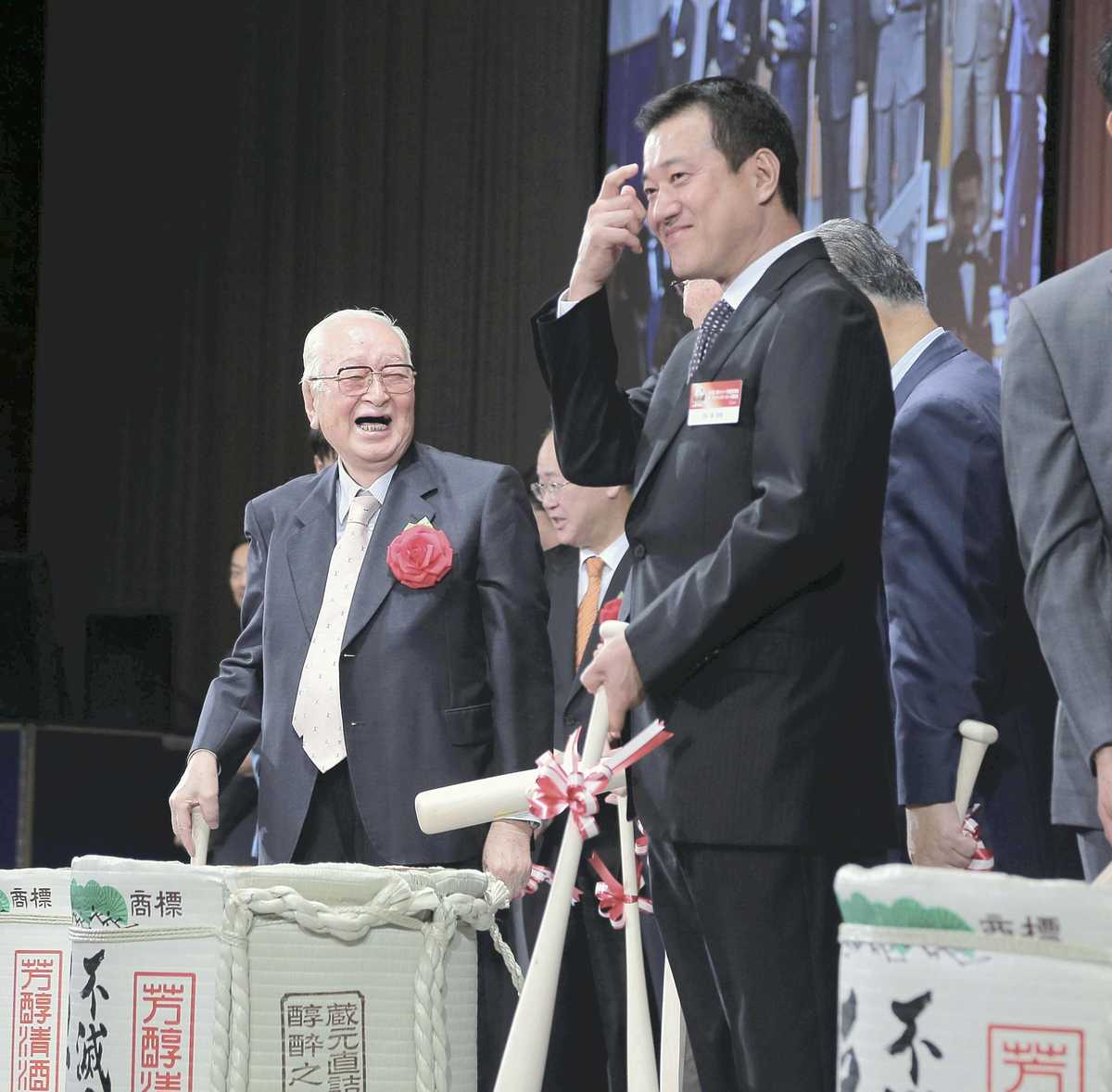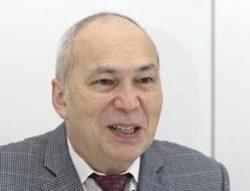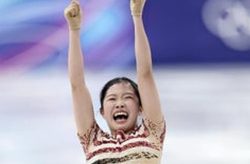Yomiuri Editor-In-Chief Watanabe A Lifelong Journalist; Used Newspaper’s Influence To Help Shape Policy

Tsuneo Watanabe
19:50 JST, December 19, 2024
The Yomiuri Shimbun Holdings Editor-in-Chief Tsuneo Watanabe, who died on Thursday, was at the forefront of the newspaper industry and led it for many years. He remained committed to his belief that he was a journalist for life, and his strong will to contemplate the future of Japan through the medium of the press never waned.
Born in Tokyo in 1926, Watanabe graduated from Kaisei Junior High School and entered then Tokyo High School, where he read philosophy books by thinkers such as Immanuel Kant, Arthur Schopenhauer, Friedrich Nietzsche and Kitaro Nishida instead of his study books. Just after he entered the department of philosophy of Tokyo Imperial University in 1945, he was conscripted into the army and became a private second class, and he served until the end of World War II. As someone who had experienced war, he felt strongly that the folly of war must never be repeated.
After the war, he joined the Japanese Communist Party and took part in student movements, but he was expelled from the party on suspicion of being a police spy. He graduated from the University of Tokyo in 1949 and joined The Yomiuri Shimbun in November 1950.
From 1952, he worked as a reporter in the Political News Department, covering prime ministers from Shigeru Yoshida onward.
He came to prominence after gaining the favor of Banboku Ono, who served as both the speaker of the House of Representatives and vice president of the Liberal Democratic Party. He got a number of scoops, including a report on a secret agreement memo exchanged between then Foreign Minister Masayoshi Ohira and Kim Jong-pil, then director of South Korea’s Korean Central Intelligence Agency, in relation to negotiations on the normalization of diplomatic relations between the two countries. Ohira and Kim each later became prime minister of their respective countries.
In his 30s, Watanabe wrote the book “Habatsu” (“Factions”), which was a factual analysis of the factions within the LDP. He evaluated the groups as having the “two benefits of ensuring intraparty democracy and streamlining intraparty management,” and said that “simply eliminating factions would be a great danger that would lead to a dictatorship by a party leader.” This classic book continues to be read by and shape the thinking of politicians and political scientists to this day.
A young Watanabe got to know the future Prime Minister Yasuhiro Nakasone through study and reading group activities, and they became lifelong friends.
Watanabe later became Nakasone’s de factio brain trust during his administration.
In 1979, Watanabe was appointed as a director and chairman of the editorial board at The Yomiuri Shimbun after serving as a political news editor. He ran unwavering editorials that will stand up to scrutiny even after 30 years, without playing to public opinion.
Of particular note was that he was one of the first to clearly advocate the introduction of sales and consumption taxes, which were opposed by most other newspapers.
Watanabe later said, “For ordinary people, the lower the taxes, the better, and the higher the standard of public services, the better. I thought, however, that these two things just do not go together, and in order to achieve fiscal soundness and establish social security, we have no choice but to adopt a tax system on a par with those of European countries.”
In the 1990s, the circulation of The Yomiuri Shimbun exceeded 10 million copies, and Watanabe decided to adopt a policy that the newspaper would carry its own policy proposals. Given The Yomiuri Shimbun’s great influence on the public, he thought it should raise specific issues in various fields, including constitutional amendment — a topic that many had avoided even discussing — in a way to widely spark a national debate.
With regard to constitutional amendment, the newspaper set up an in-house group to study constitutional issues, made up of several departments including the Editorial Bureau, the Editorial Board and the Yomiuri Research Institute.
The Yomiuri Shimbun proposed several revisions to the Constitution in its morning edition of Nov. 3, 1994.
There was some vehement opposition to the proposals on the grounds of defending the Constitution, and other newspaper companies criticized the proposals for “deviating from the mission of a media outlet.”
But the proposals led to a spate of suggestions on the revision of the Constitution from not only political parties but also other newspapers, intensifying the constitutional debate. The initiative thus proved to be extremely significant.
The Yomiuri Shimbun has also made many other proposals, including on security, the tax system, social security and administrative reform. More than a few of these proposals have been utilized in government policies.
In 2005, the 60th year after the end of World War II, The Yomiuri Shimbun launched the yearlong series “Kensho: Senso Sekinin” (Examining war responsibility) in an effort by the Japanese people themselves to clarify the responsibility for the war, which enhanced the company’s reputation domestically and internationally.
This series was driven by the strong desire of Watanabe, who experienced the war as a private: “The folly of militarism must not be repeated.”
“Millions of people were killed, and Japan was reduced to ruins. Politics cannot be conducted properly unless those who were responsible are held to account,” Watanabe said in an NHK interview about the series in August 2020. “We need to inform young people about the war. I felt that we had to conduct a campaign to establish war responsibility before we could move forward.”
Interacting with dignitaries

Tsuneo Watanabe, left, smiles beside former Yomiuri Giants manager Tatsunori Hara at the Yomiuri Giants’ Central League championship celebration in October 2012.
Watanabe met overseas dignitaries such as Henry Kissinger, a former U.S. secretary of state, and Kim Jong-pil, a former prime minister of South Korea. Watanabe talked to then U.S. President Donald Trump at a dinner held during the latter’s visit to Japan in November 2017. He is said to have surprised Trump, by saying, “The Yomiuri Shimbun doesn’t blindly criticize the government.”
Until his death, he remained concerned about economic recovery, the future of social security reform amid a low birth rate and aging population and the worsening security environment surrounding Japan.
In 2012, Watanabe published a book titled “Han-Populism Ron” (Anti-populism essay), showing that he had grown strongly concerned about the proliferation of populism. He was also worried about the spread of misinformation and slander through social media. To counteract the situation, he had an unwavering belief that maintaining print culture, which is part of the “fundamentals of cultivating knowledge,” is essential.
At a meeting of heads of Yomiuri Centers (newspaper sales and delivery agencies) in January 2018, Watanabe said: “While fighting these harmful effects, we absolutely need print culture to ensure that children receive normal and healthy educations as well as to strengthen all information, including about daily lives and international affairs, in a systematic and accurate manner. From now on, print culture must counter online information and regain its original role.
“I believe that is the mission of us newspaper people,” he added.
Key figures remember Watanabe
Messages of condolence regarding the death of Watanabe arrived from various quarters on Thursday.
“He encouraged me whenever we met while I was the prime minister, and every time I was grateful for his kind words,” former Prime Minister Fumio Kishida said. “As a man of letters and of the mass media, he greatly influenced [post-World War II] Japan. An era has ended.”
In his statement, Shiro Nakamura, the current head of the Japan Newspaper Publishers & Editors Association, said that Watanabe “exerted himself for the development of the world of newspapers as the head and a board of directors member” of the organization.
“He proactively worked for the promotion of print culture, for example by putting all his efforts into the resale price maintenance system for printed material, which is a fundamental principle for newspaper management,” said Nakamura, also the chairman of The Asahi Shimbun Co. “I would like to express my gratitude for his long-time contributions to the world of newspapers.”
Takashi Mikuriya, a professor emeritus in political studies at the University of Tokyo, served as the interviewer for “Watanabe Tsuneo Kaikoroku” (Tsuneo Watanabe: a memoir), which was published in 2000.
“His talks were like casual chats and were fun — I got the impression that he laughed a lot,” Mikuriya said. “Even in his later years, he remained a newspaper reporter fully committed to writing.”
Hayashi: Post-war living witness
Chief Cabinet Secretary Yoshimasa Hayashi expressed his condolences on Watanabe’s passing.
“Mr. Watanabe is a living witness to post-war politics who interacted with many politicians,” Hayashi said at a press conference. “I learned a great deal from his extensive knowledge and insight into politics. I would like to express my deepest condolences.”
Top Articles in Society
-

Man Infected with Measles May Have Come in Contact with Many People in Tokyo, Went to Store, Restaurant Around When Symptoms Emerged
-

Woman with Measles Visited Hospital in Tokyo Multiple Times Before Being Diagnosed with Disease
-

Australian Woman Dies After Mishap on Ski Lift in Nagano Prefecture
-

Man Infected with Measles Reportedly Dined at Restaurant in Tokyo Station
-

Foreign Snowboarder in Serious Condition After Hanging in Midair from Chairlift in Nagano Prefecture
JN ACCESS RANKING
-

Japan Institute to Use Domestic Commercial Optical Lattice Clock to Set Japan Standard Time
-

Japan PM Takaichi’s Cabinet Resigns en Masse
-

Israeli Ambassador to Japan Speaks about Japan’s Role in the Reconstruction of Gaza
-

Man Infected with Measles May Have Come in Contact with Many People in Tokyo, Went to Store, Restaurant Around When Symptoms Emerged
-

Prudential Life Insurance Plans to Fully Compensate for Damages Caused by Fraudulent Actions Without Waiting for Third-Party Committee Review



















